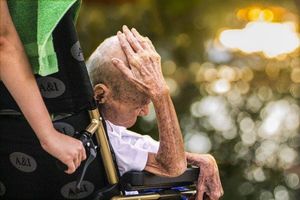The case against legalising euthanasia and assisted suicide
‘For two millennia the Hippocratic tradition has stood for the “sanctity” of human life. We can alleviate the unbearable in life better than ever before. We can do that and not eliminate life itself … medicine cannot be both our healer and our killer’ (C. Everett Koop, former Surgeon General of the United States).
Courts in the English-speaking world have recently witnessed a number of high-profile and distressing cases where individuals have argued either for the ‘right to die’ or for the ‘right to live’ in the event of incapacitation.
But it was perhaps the troubling case of a young American woman, Terri Schiavo, that split the conscience of a nation – causing a public debate which cut deep into the American psyche and exposed the core ethical arguments as never before.
At the heart of the debate was not only the ‘human right’ to life but the ‘right’ for society in general to be complicit in granting or refusing the extension of life.
‘No man has power to retain the spirit, or power over the day of death’ (Ecclesiastes 8:8).
Clarifying our terms
Before tackling the issue itself we need to clarify our terminology.
1. ‘Suicide’ is self-killing – some would say self-murder.
2. ‘Assisted suicide’ involves enlisting the aid of another person, often a doctor, to end one’s own life. Those ‘assisting’ provide the means of death but do not take part in the killing directly.
3. ‘Voluntary euthanasia’ occurs when the patient agrees to another person (such as a doctor or nurse) performing an action, such as giving a lethal injection, which causes the patient’s death.
4. ‘Involuntary euthanasia’ is where another person, without the patient’s agreement, performs a deliberate action that leads to the patient’s death. This might include withdrawing food and fluids administered by tube – effectively starving the patient to death, as in the case of Terri Schiavo.
Historically, switching off artificial respiration aids (without which the patient would simply stop breathing) when the patient is already brain dead has never been considered euthanasia.
Worldviews
Let me speak bluntly – euthanasia can never be justified morally in the light of sound reason or medical science. Moreover, I oppose euthanasia because, as a Bible-believing Christian, I believe the Creator is demonstrably opposed to it – he makes no provision for it in his revealed will to mankind.
That we shall take for granted. It is not my purpose here to present the biblical teaching but rather to show how that teaching is in harmony with all the ethical, philosophical and reasoned arguments one can make. This, I hope, will offer readers an insight into the case against legalising euthanasia that will reinforce the biblical arguments.
But I mention my biblical worldview with good reason. All too often, the public debate obscures the issue of ‘worldview’ (the cultural or philosophical spectacles through which we all view the world).
Indeed, many Christians feel it wise not to mention their biblical presuppositions – because they think that the liberal or secular person approaches the subject pragmatically, with an open mind.
Nothing could be further from the truth! Everyone in this debate is ‘coming from’ some worldview – which they articulate explicitly or implicitly and which affects and underpins the opinions they express.
The heart of the matter
This is no secondary matter. When all is said and done, the Judaeo-Christian worldview is a well-reasoned pattern of belief in which the sanctity of life is given moral substance. Those who criticise our worldview should, in fairness, explain and defend their own.
Bible-believing Christians can point to a ‘gold standard’ of right or wrong – the Judeo-Christian moral heritage on which Western civilization is founded. Those who hold secular and liberal worldviews often struggle to sustain them.
This is because the biblical worldview focuses on the higher good of the community, whereas a secular worldview usually focuses on the rights of the individual. There must always be a balance, of course, between the respective rights of society and individual, but in the end one must outweigh the other. And the Bible (as well as historic tradition) requires that the good of the community must win out.
Mind and body
Here, in a nutshell, are the key practical arguments against legalising euthanasia or assisted suicide.
1. A request for assisted suicide is typically a cry for help – a call for counselling, assistance and positive alternatives to solve very real problems.
2. Suicidal intent is typically transient. Of those who attempt suicide, less than 4% go on to kill themselves in the next five years. Less than 11% will commit suicide over the next 35 years.
3. Terminally-ill patients who desire death are typically depressed – and depression is treatable. In one study, 24% of those desiring death had clinical depression.
4. Pain is controllable. The array of treatments to control pain (‘palliative care’) is vast and impressive. Often the person’s real need is not death but a doctor better trained in palliative care. The Nightingale Alliance states that 95% of all pain is controllable and the other 5% can be reduced to tolerable levels.
5. Legalising voluntary euthanasia almost always means legalising involuntary euthanasia. State courts in the USA have consistently ruled that if competent people have a right to die, then incompetent people must be ‘given’ the same ‘right’. It is highly likely that the British courts would rule the same way.
6. In the Netherlands, legalised voluntary euthanasia for those with terminal illness has spread to include involuntary euthanasia for people with no terminal illness. Half the ‘mercy killings’ there are now non-voluntary, and a ‘culture of death’ has taken root. This is admitted privately by many Dutch doctors. It has become a common legal ‘solution’ for those with mental illnesses, permanent disability, and even old age.
7. You don’t solve problems by eliminating the people who have the problems. The more difficult but humane solution to human suffering is to address the problem, not get rid of the human.1
The Dutch experience
The oft-cited experience of legalised euthanasia in the Netherlands is worthy of close scrutiny. Herbert Hendin MD, Executive Director of the American Suicide Foundation and Professor of Psychiatry at New York Medical College, has written an authoritative analysis of euthanasia in the Netherlands in his book Seduced by death: Doctors, patients and the Dutch cure. Here are some key quotes:
‘The doctors who help set Dutch euthanasia policies are aware that euthanasia is basically out of control in the Netherlands. They admitted this to me privately. Yet in their public statements and articles they maintain there are no serious problems’ (p.14).
‘The experience of the Dutch people makes it clear that legalisation of assisted suicide and euthanasia is not the answer to the problems of people who are terminally ill. The Netherlands has moved from assisted suicide to euthanasia; from euthanasia for people who are terminally ill to euthanasia for people who are chronically ill; from euthanasia for physical illnesses to euthanasia for psychological distress; and from voluntary euthanasia to involuntary euthanasia (called “termination of the patient without explicit request”). The Dutch government’s own commissioned research has documented that in more than one thousand cases a year, doctors actively cause or hasten death without the patient’s request’ (p.23).
‘Virtually every guideline established by the Dutch to regulate euthanasia has been modified or violated with impunity’ (p.23).
‘In the selling of assisted suicide and euthanasia, words like “empowerment” and “dignity” are associated with the choice for dying. But who is being empowered? The more one knows about individual cases, the more apparent it becomes that needs other than those of the patient often prevail. ‘Empowerment flows towards the relatives, the doctor who offers a speedy way out if he cannot offer a cure, or the activists who have found in death a cause that gives meaning to their own lives. The patient who may have asked to die in the hope of receiving emotional reassurance that all around her want her to live, may find that … she has set in motion a process whose momentum she cannot control’ (pp.43-44).
Conclusion
There are no scientific, medical or ethical reasons why anyone (not just Christians) should condone or support the legalisation of euthanasia. No one can stop a determined person blowing their brains out or taking a lethal dose of drugs. But that is not the issue here.
The question is whether there are sound reasons why society should: (1) acquiesce in the process of self-destruction by offering it as a valid option; and (2) agree to one person terminating the life of another because the quality of that life is deemed poor.
If we are intent on protecting the weak and retaining our current culture in the Hippocratic tradition, then we must vigorously resist the culture of uncertainty and of death that has enveloped the Netherlands.
‘No man has power to retain the spirit, or power over the day of death’ (Ecclesiastes 8:8).
Endnote
1. Taken from the Suicide Factsheets, the NRLC Dept. of Medical Ethics, Washington, 2004.
The author’s book The politics of faith: Essays on the morality of key current affairs is available at Biblio.





